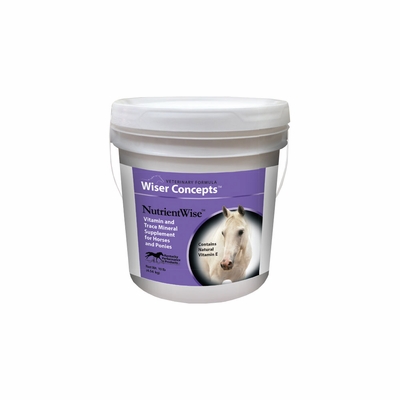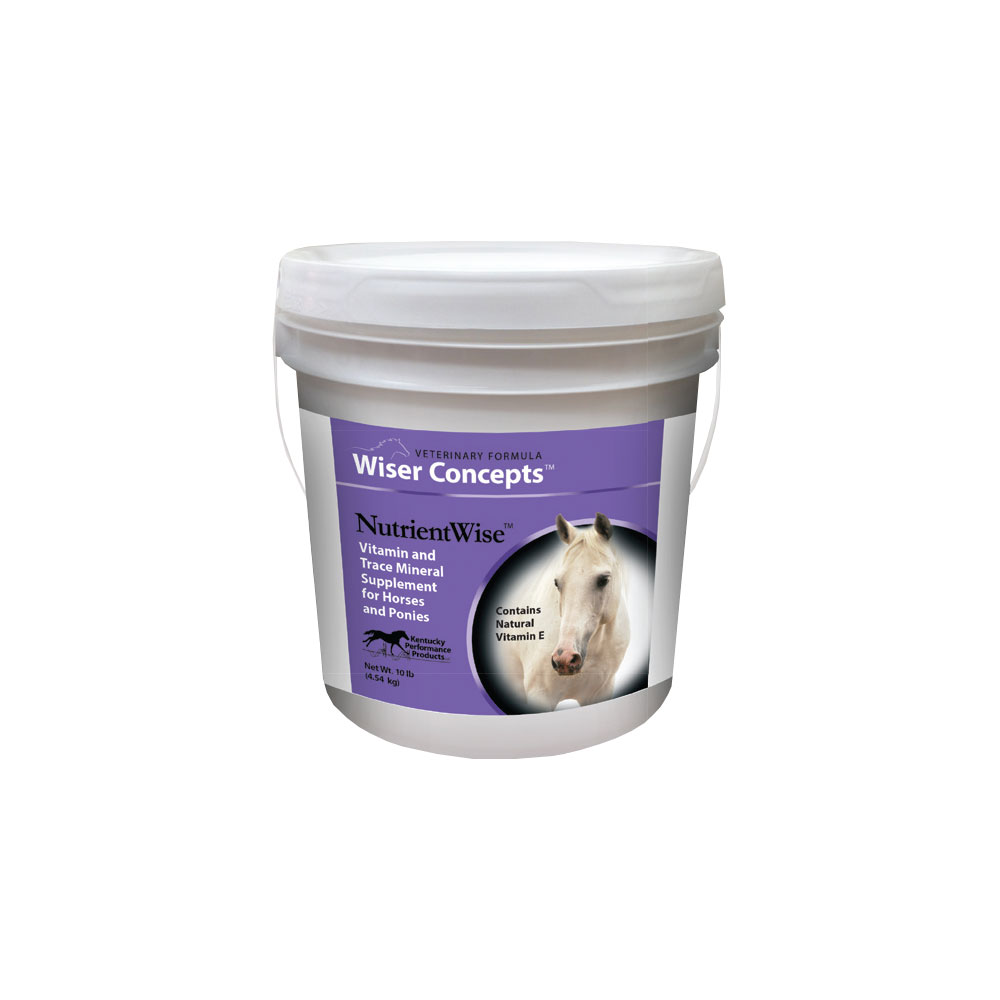NutrientWise Vitamin & Trace Mineral Supplement for Horses (20 lb)
Description
NutrientWise provides the vitamins and minerals necessary to the maintenance of overall good health. When your horseís daily diet canít provide all the nutrition he needs, turn to NutrientWise to fill the gaps.
- Adds essential vitamins and minerals that counter the effects of oxidative stress caused by normal metabolism and exercise. The harder a horse works, the more nutritional support it needs.
- Contributes essential vitamins and minerals to a diet containing mostly hay, hay cubes or fiber pellets. This is especially important in diets where grass and grain is limited due to metabolic disease or weight control.
- Delivers vitamins and minerals that support a robust immune system in horses of all ages.
- Fills in dietary gaps for horses that are not eating recommended levels of fortified concentrates (pellets or sweet feeds).
- Maintains adequate nutrient levels to support the healing of tissue and bones in horses that are recovering from illness or injury and are on restricted diets.
- Provides the supplementation necessary to protect the nutritional status of both the mare and her foal during the last trimester of pregnancy and lactation.
- Supplies additional vitamins and minerals to support the rapid bone and muscular growth in young horses.
NutrientWise:
When health issues arise, always seek the advice of a licensed veterinarian who can help you choose the correct course of action for your horse. Supplements are intended to maintain healthy systems and support recovery and healing. They are not intended to treat or cure illness or injury.
Recommended for
- Training and competing vigorously
- Consuming diets limited in fresh green grass and/or eating poor-quality hay
- Being fed less than the recommended amounts of fortified concentrates (pellets or sweet feed)
- Living in high-stress situations, such as frequent travelers and/or horses being relocated
- Recovering from injury where additional nutrition is needed to promote healing
- Recuperating from illness where the digestive tract has been compromised or a restricted diet or medication might interfere with adequate nutrient intake
- Young growing horses in need of additional nutrition
- Last trimester pregnant or lactating mares and breeding stallions
Veterinarians often recommend vitamin and mineral supplements. NutrientWise is recommended for horses that are:
Ingredients
| Guaranteed Analysis: | ||
|---|---|---|
| Per 1 oz | Concentration | |
| Crude Protein min | 15 g | 14% |
| Calcium min | 3 g | 2.5% |
| Calcium max | 3.4 g | 3.0% |
| Phosphorus min | 1.5 g | 1.5% |
| Copper min | 136 mg | 1,200 ppm |
| Selenium min | 1.8 mg | 16 ppm |
| Zinc min | 400 mg | 3,520 ppm |
| Vitamin A min | 40,000 IU | 162,000 IU/lb |
| Vitamin D min | 4,000 IU | 16,000 IU/lb |
| Vitamin E min | 720 IU | 2,880 IU/lb |
| Thiamine min | 24 mg | 96 mg/lb |
| Choline min | 650 mg | 2,600 mg/lb |
| Folic Acid miN | 12 mg | 48 mg/lb |
| Niacin min | 120 mg | 480 mg/lb |
| Pantothenic Acid min | 50 mg | 200 mg/lb |
| Riboflavin min | 40 mg | 160 mg/lb |
| Vitamin B12 min | 120 mcg | 480 mcg/lb |
More information about the ingredients in NutrientWise
NutrientWise is a very palatable alfalfa-based pellet that adds nutrients to the diet without adding additional calories. It contains the vitamins and trace minerals typically missing from the modern equine diet.
Vitamins
Many vitamins are available in fresh plant material, such as pasture, but their potency diminishes over time when fresh forage is stored as hay. Horses that are not consuming significant amounts of green grass may need additional supplementation.
Fat-soluble Vitamins
The fat-soluble vitamins are stored in your horseís body and used as needed. Hard-working horses or horses under stress can deplete stores of fat-soluble vitamins leading to deficiencies.
Vitamin A
Vitamin A plays a role in digestion, respiration, reproduction, and vision. In growing horses vitamin A is important to proper bone development. Vitamin A is not found in nature; instead, it is synthesized from carotenes in the small intestine. Green grass is an excellent natural source of beta-carotene, which is metabolized into vitamin A. When green grass is lacking in the diet it is particularly important that vitamin A be supplemented.
Vitamin D
Vitamin D plays a major role in the absorption of calcium in the small intestine. Once absorbed, vitamin D aids in the transportation to and the accumulation of calcium in the bone and other tissues.
Natural Vitamin E
Vitamin E cannot be synthesized by the horse; therefore, it is considered an essential nutrient. Natural vitamin E is a powerful antioxidant that limits the damage caused by oxidative stress and the actions of free radicals. It maintains healthy muscle and nerve function and supports a strong immune system in horses of all ages.
The best source of vitamin E is fresh green grass; however, the potency of vitamin E declines very quickly once forages are harvested and dried. Multiple research studies have shown that vitamin E is often deficient in the diets of horses that do not have access to continual grazing on fresh green grass, or those grazing on winter pasture. Beware, not all forms of the vitamin are created equally. Many supplements contain synthetic vitamin E (dl-alpha-tocopherol), which is not as potent as natural vitamin E (d-alpha-tocopherol). Compared with synthetic vitamin E, the body can more efficiently transport and deliver natural vitamin E to targeted tissues. Current research in several species, including horses, shows that natural vitamin E is two to three times more potent than synthetic.
Water-soluble Vitamins
Water-soluble vitamins are not stored in your horseís body, so they need to be provided in the proper amounts in the diet. Horses that are working hard or are stressed may need additional supplementation.
Thiamine, Niacin, Pantothenic Acid
These vitamins play a role in the metabolism of proteins, fats, and carbohydrates.
Riboflavin
Also known as B2, riboflavin influences energy production and growth.
Folic Acid
Folic acid, or B9, is important for red blood cell development.
Vitamin B12
Cobalamin, B12, plays a role in energy metabolism and maintaining the manufacturing of red blood cells.
Choline
Choline supports cellular functions in multiple ways. It is a component of lipids and plays an important role in normal cell structure and activity. It contributes to normal fat metabolism in the liver, increasing fatty acid utilization. As a precursor of acetylcholine, it supports the transmission of nerve impulses. Choline is thought to have an impact on concentration, memory and muscle performance, and prevents fat buildup in the liver.
Minerals
Minerals are inorganic compounds that serve both as components in body tissue and as catalysts for various body processes. The trace minerals in NutrientWise are chelated, which increases digestibility and absorption.
Calcium
A main building block of your horseís skeleton, calcium also supports proper muscle contractions and plays a role in blood clotting.
Phosphorus
Essential to healthy bones and energy transfer reactions, phosphorus also plays a role in the synthesis of certain proteins. Calcium and phosphorus must be provided in the appropriate ratios. NutrientWise contains a balanced Ca:P ratio.
Copper
Copper is necessary for healthy connective tissue, cartilage, and bone. Other important functions of copper include red blood cell formation, hoof wall formation, and hair pigmentation.
Selenium
Selenium works in concert with vitamin E to defend the bodyís cells from damaging oxidative byproducts known as free radicals. Selenium is a component of a beneficial enzyme that prevents free radicals from forming. Free radicals are released during normal energy production. Horses use energy to fuel bodily functions and movement. The greater the demand for energy, the greater the number of free radicals produced. Your horseís body is equipped to deal with small amounts of these oxidative byproducts, but as the demand for energy increases, so does your horseís need for additional antioxidants to counter the onslaught of free radicals.
Zinc
Zinc plays a role in healthy hooves and coat, bone development, and reproduction. It is also critical to proper immune function. Zinc is a trace mineral vital to proper enzyme function in protein metabolism. NutrientWise contains zinc proteinate, the form of zinc most easily digested by horses.
Yeast cultures
Research has shown that high-quality yeast cultures help horses maintain a healthy digestive tract and increase the digestibility of nutrients by stimulating the activity of the good microorganisms in the hindgut. A healthy microbial population will also reduce the incidence of digestive upset and contribute to a healthy immune system.
Useful Information
Mix recommended amount in total daily grain ration
| Type of Horse | Scoops/Day |
|---|---|
| Maintenance Barren Mares Light Training | 1 |
| Yearlings, Pregnant Mares, Lactating Mares, Stallions, Moderate Training | 1.5 |
| Foals, Weanlings, Lactating Mares (first 3 months), Late Pregnant Mares (last 3 months), Intense Training | 2 |
Storage and shelf life: Store NutrientWise in a cool, dry place and keep lid tightly closed between uses. Shelf life is 24 months from date of manufacture when stored under suitable conditions.


